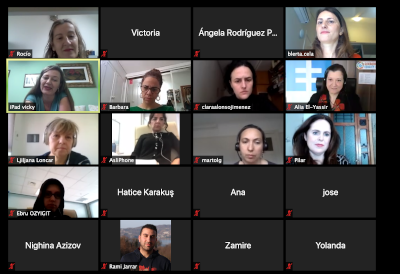COVID-19 crisis and the Spanish experience: “Women need to know that we are with them”
UN Women brought together partners from the region and representatives from the Ministry of Equality of Spain in the webinar “Preventing and responding to violence against women in the face of COVID-19: The Spanish case”.Date:

More than 50 representatives of governments, EU delegations, UN agencies, and UN Women across the Europe and Central Asia region attended the virtual meeting “Preventing and responding to violence against women in the face of COVID-19”. The meeting featured presentations by representatives of the Ministry of Equality from Spain, about the measures adopted in Spain to combat gender-based violence during the COVID-19 crisis.
“Spain has a long-standing expertise in addressing violence against women, having been at the forefront in pushing for normative frameworks, provision of services and moving entire population towards zero tolerance to violence. It is an opportunity for us to learn first-hand from Spain and gather lessons that could be scaled up and introduced in countries where the risk is higher. It is a very timely discussion as we are trying to deal with a new reality,” said Alia El-Yassir, UN Women Regional Director for Europe and Central Asia.
Victoria Rosell, the delegate of the Government of Spain against Gender based Violence, mentioned the importance of effective action by governments to ensure the protection of survivors of gender-based violence and their access to the necessary services during the pandemic. “The Spanish Ministry of Equality has promoted a contingency plan, which contains a series of strategic and operational measures to help prevent, control and minimize the possible negative consequences in the lives of many victims of gender-based violence resulting from the confinement measures,” said Ms. Rosell.
More specifically, the contingency plan affirms that specialized services for survivors of gender-based violence are declared as essential. “Specialized services protecting and assisting victims of violence against women and their children should be declared as essential during COVID-19,” pointed out Bárbara Tardón, the Advisor to the Spanish Minister of Equality,
These services include:
- 016 telephone helpline (24/7) for information, referrals and legal assistance.
- Online services monitoring compliance with restraining orders.
- Emergency centres, shelters and any safe accommodation prepared for women and their children. If there are no available places in the regular shelters, tourist accommodations are made available.

Another measure included in the contingency plan is the new instant messaging service offered via WhatsApp, available 24/7 for advice and immediate emotional and psychological counselling for survivors. The service is run by a team of women psychologists specialized in gender-based violence and is provided by a private company the Ministry has been collaborating with for many years.
At the same time, the Ministry of Equality has launched an information campaign for victims of gender-based violence to publicize the services available to them. The campaign “We are with you. We stop gender-based violence together” calls on society to stand together against violence against women. It aims to deliver the message that gender-based violence is not a private problem, but rather a human rights violation that concerns the whole society. The campaign is also available on print materials and displayed in communities, for example at pharmacies, making sure that women with no access to digital platforms can reach the information.
The last measure included in the contingency plan is a guide for women suffering gender-based violence during lockdown. The guide addresses the main questions posed by women suffering from domestic violence.
The virtual event ended with closing remarks from Pilar Vilaplana, the Senior Advisor to the Government Delegate for Gender-based Violence for the Spanish Ministry of Equality, who stressed the importance of awareness raising during the crisis. It is important, she said, “to let women know that they are not alone, that they have access to all the services because they are essential and the society is encouraged to contribute to help these women and to help public authorities to protect them by reporting violence cases.”
“Women need to know that we are here to help them, all together against gender-based violence. The governments, state and civil society organizations across the world need to send this message to women that are suffering now from gender-based violence,” said Bárbara Tardón.